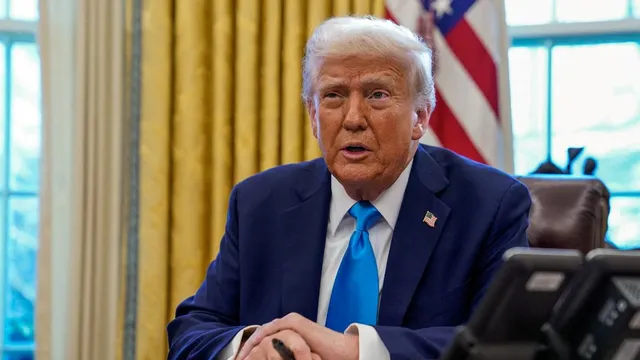- By Supratik Das
- Sat, 02 Aug 2025 07:39 AM (IST)
- Source:JND
US Tariff War: In a major development that would redefine global energy and trade relations, United States President Donald Trump on Friday said India might have stopped buying crude oil from Russia and described it as "a good step" if true. The statement was made amid rising US pressure on New Delhi to end energy relations with Moscow, following ongoing sanctions against Russia for its war against Ukraine. Although India neither confirmed nor contradicted an official shutdown of Russian oil imports, sources quoted by Reuters suggested a visible slowdown in buying from Russian companies by state-owned oil companies.
In an interview with ANI, President Trump answered a query about sanctions and how he feels about India's energy transactions with Russia. "I understand that India is no longer going to be buying oil from Russia. That's what I heard, I don't know if that's right or not. That is a good step. We will see what happens..." says, US President Donald Trump on a question by ANI, if he had a number in mind for the penalties and if he is going to speak with PM Modi." Trump stated.
#WATCH | "I understand that India is no longer going to be buying oil from Russia. That's what I heard, I don't know if that's right or not. That is a good step. We will see what happens..." says, US President Donald Trump on a question by ANI, if he had a number in mind for the… pic.twitter.com/qAbGUkpE12
— ANI (@ANI) August 1, 2025
However, even as he welcomed the potential move, Trump announced the imposition of a 25 per cent tariff on Indian goods, citing India’s historically high tariffs on American imports. “India was one of the highest tariff nations in the world. They had tariffs at 100 per cent, 150 per cent, even 175 per cent. Now they’re willing to cut it substantially, but we’ll see what happens,” he said.
India Commits To Energy Sovereignty, Refuses Specific Decisions
India’s Ministry of External Affairs (MEA) responded cautiously to the developments. In the weekly media briefing, MEA spokesperson Randhir Jaiswal reiterated that India's energy policy is driven by market forces and national interest, rather than foreign pressure. "You are aware of our broad approach to energy sourcing requirements, that we look at what is available in the market and the prevailing global situation. We are not aware of any specifics," Jaiswal said.
According to a Reuters report, India’s key state-run refiners — including Indian Oil Corporation (IOC), Bharat Petroleum (BPCL), Hindustan Petroleum (HPCL), and Mangalore Refinery and Petrochemicals Ltd (MRPL) have not made purchases of Russian oil over the past week. These refiners are now sourcing alternatives from Middle Eastern grades like Abu Dhabi’s Murban crude and West African oil.
India-US Trade Relations on Brink?
Even after issuing penal trade actions, President Trump once again affirmed his friendship with Prime Minister Narendra Modi and was hopeful regarding ongoing negotiations. Responding to ANI, if the US is still willing to negotiate with India on the tariff level, Trump said, "We're talking to them now. We'll see what happens. Again, India was the highest or just about the highest tariff nation in the world, one of the highest, 100 points, 150 points or percentages. So India was one of the highest in the world. They had 175 per cent and higher than that." He emphasised India-US ties, calling Prime Minister Narendra Modi a "friend," while noting the US trade deficit with India. He further stated that it "doesn't matter too much" if the India-US deal reaches a certain tariff. "As you know, Prime Minister Modi is a friend of mine, but they don't do very much business in terms of business with us. They sell a lot to us, but we don't buy from them. You know why? Because the tariff is so high. They have one of the highest tariffs in the world. Now they're willing to cut it very substantially. But we'll see what happens. We're talking to India now," the US President said.
ALSO READ: BRICS, Russia, And Tariff: Why US Thinks Trade With India Is 'Too Complex To Be Resolved'
It is presently studying the effects of these developments and will take all steps needed to protect the national interest. India has time and again asserted its policy of strategic autonomy and independent foreign policy decision-making, especially on energy security. The recent shift in sourcing patterns may reflect both geopolitical recalibration and market considerations, rather than an official policy reversal.

